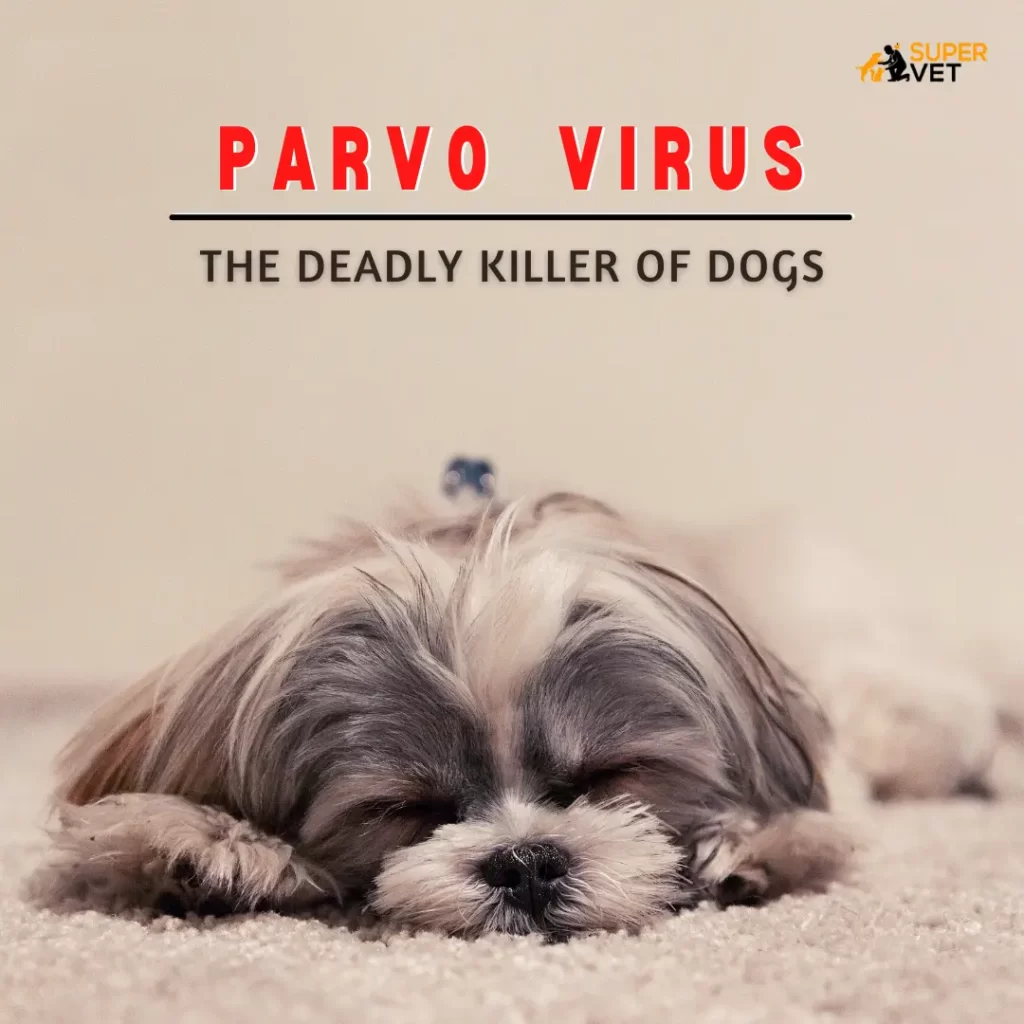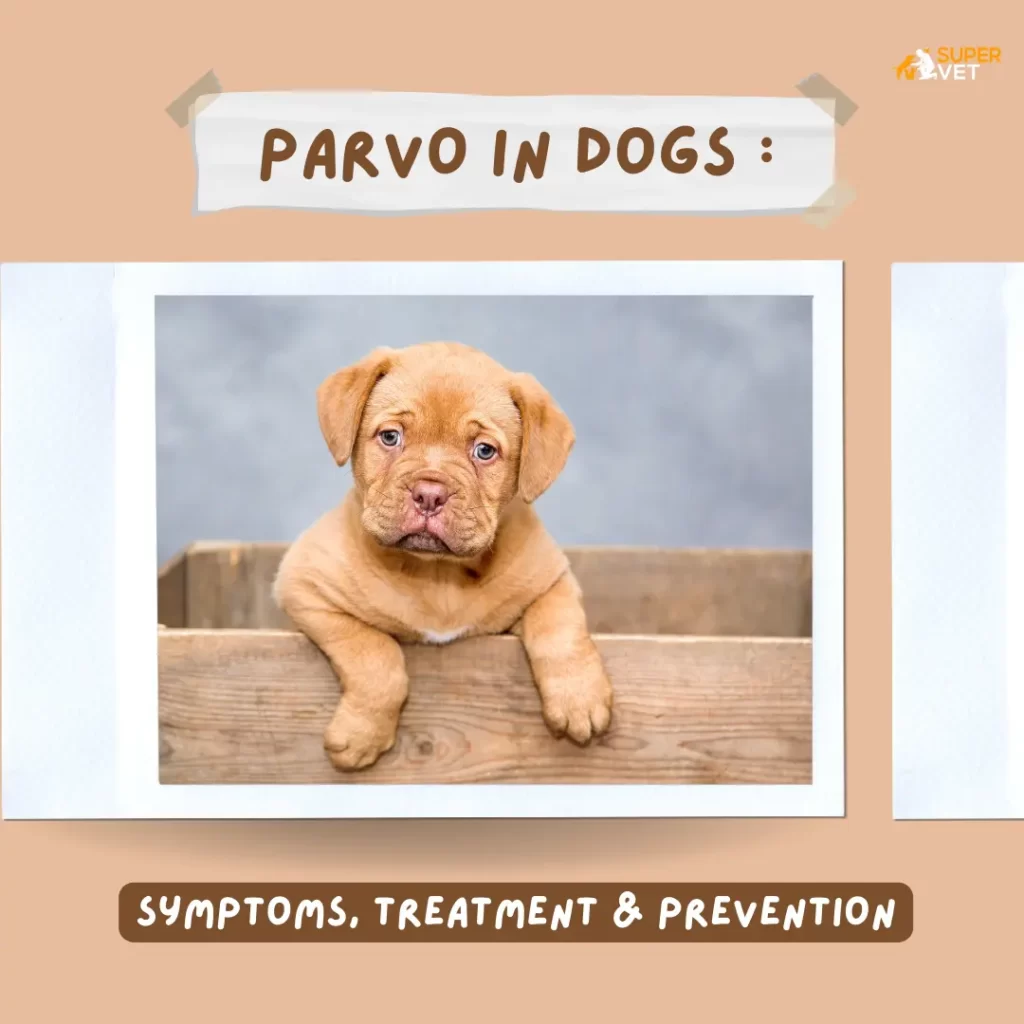Every pet owner should read a comprehensive guide to Parvo in Dogs.
Most people are aware of the common cold or flu. However, there is another virus that is much more dangerous and deadly – Parvovirus, also known as “Parvo”.
If you’re a pet owner, there’s a good chance you’ve heard of the parvovirus. This highly contagious disease can affect dogs of all ages but is most commonly seen in puppies. This virus attacks the gastrointestinal system of dogs and puppies and can be fatal if not treated promptly.
Unfortunately, there is no cure for Parvo and it is highly contagious. Although Parvo is deadly if left untreated, prevention is key. Thankfully there are some simple steps you can take to protect your pup.
It’s important to know the symptoms, treatment, and prevention of Parvo in puppies so that you can keep your furry friend healthy and safe.
- What is Parvo?
- What are the symptoms of Parvo in puppies?
- How is Parvo treated?
- How can you prevent your pup from getting Parvo?
What is Parvo in Dogs and Puppies?
Most people have heard of parvo, but many have yet to learn exactly what it is. Parvo is a virus that primarily affects puppies and young dogs, though it can also affect unvaccinated adult dogs.
Parvo or canine parvovirus (CPV) disease appeared for the first time in dogs in 1978. Puppies between the ages of 6 weeks and 4 months old are especially susceptible to parvo because they have not yet been vaccinated against it.
It is a highly contagious virus that attacks a puppy’s intestines and stomach and can cause severe gastrointestinal illness, often leading to dehydration and death.
It can be transmitted through contact with an infected dog or contact with contaminated objects like infected feces, either directly or indirectly. The virus can live in the environment for weeks, and even longer in cool weather.
If left untreated, the virus can quickly lead to dehydration and death. Making good hygiene is essential to preventing the spread of the disease.
What are the symptoms of Parvo in Dogs?
There are a few things to look out for when determining if your puppy has Parvo. Up to 10% of all puppies will contract Parvo, and it is most common in puppies between the ages of 6 weeks and 4 months.
Puppies with Parvo typically show the following signs –
- Anorexia (loss of appetite)
- Lethargy
- Severe Diarrhea (often bloody)
- Vomiting
- Fever
- Weakness
- Weight Loss
- Dehydration
- Depression
If your puppy is exhibiting any of these symptoms, it’s essential to take them to the vet right away for an examination. They will need intensive treatment including fluids and IVs to prevent dehydration.

How is Parvo treated?
There is no one-size-fits-all answer to this question. Treatment for Parvo will vary depending on the severity of the symptoms and how early this disease will be caught.
If your puppy contracts parvo, treatment is possible but it can be expensive. The first step is to get your puppy to a vet as soon as possible. Puppies with Parvo need to be isolated from other dogs to prevent the spread of the disease.
If caught early, parvo can be treated with fluids given through an IV and electrolytes to prevent dehydration, antibiotics to fight infection, antiemetics to control vomiting, and pain relief. The goal is to keep the puppy hydrated and help their immune system fight off the virus.
In case of more severe cases may require hospitalization and intensive care and more intensive treatment may be necessary, such as surgery, blood transfusions, or oxygen therapy.
In either case, treatment for parvo includes aggressive supportive care to manage dehydration, electrolyte imbalances, and vomiting/ diarrhea. Antibiotics are also used to treat secondary bacterial infections that can occur in puppies with parvo.
How can you prevent your pup from getting Parvo?
As a new puppy owner, you may be wondering what Parvo is and how you can prevent your precious pup from getting it. Parvo is a deadly virus that affects dogs, particularly puppies.
It is important to be aware of the symptoms of Parvo in puppies so that you can take steps to prevent your puppy from contracting it. Even though Parvo is highly contagious, there are some things you can do to help prevent your puppy from getting it.
Early diagnosis and treatment are critical for preventing serious complications from Parvo. You can take several steps to prevent your puppy from getting Parvo.
- First, you have to make sure they are up-to-date on their vaccinations. The acronyms of the canine parvovirus vaccine are DHPP, DAPP, DA2PP, DHLPP, and others.
- Puppies should receive their first set of vaccinations when they are 6-8 weeks old, then another set every 4 weeks until they are 16 weeks old.
- After that, they should get booster shots once a year for life.
If you have an older dog that has never been vaccinated against Parvo, or whose immunity is unknown. It is best to keep them away from areas where the virus may be present such as parks, kennels, dog beaches, or dog runs.
Puppy classes at a reputed training center are an exception. Training and socialization at a premature age are essential to our pups.
While there is no cure for Parvo, early treatment can help increase the chances of survival.
Summary
There are a lot of things to know about the parvo virus and how it can affect your dog. This virus is severe and deadly, so it is important to know about it.
Parvovirus is deadly if not treated immediately and can cause long-term health problems. There is no specific cure for Parvo but aggressive treatment by an experienced veterinarian can save your puppy’s life.
As an owner of a Puppy, you should know the habits of your pups. So you can notice If they show any abnormalities in their behavior. You should also provide a hygienic environment for your little friend.

